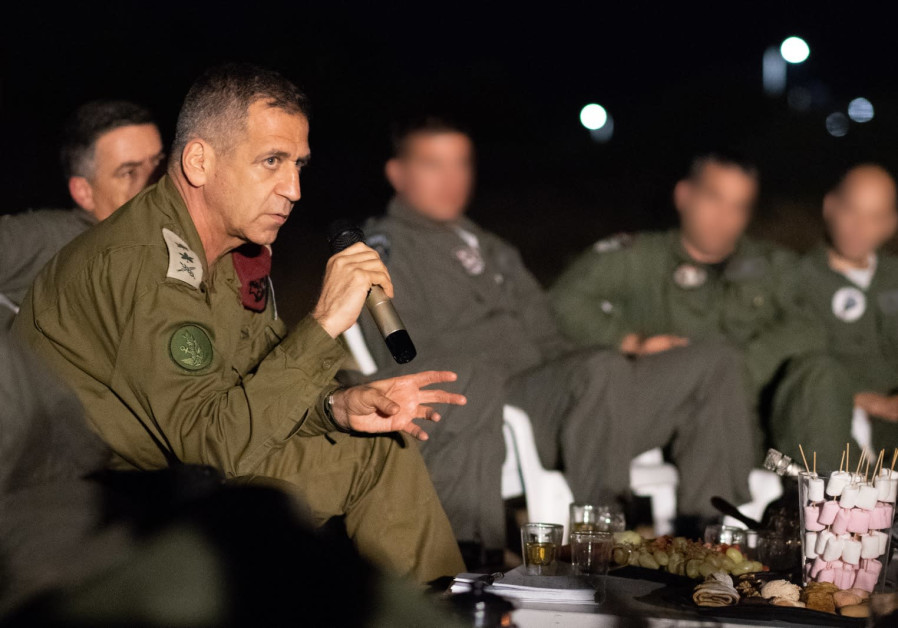It’s time Kochavi speaks up, tell truth about threats to Israel – analysis

IDF Chief of Staff Lt.-Gen. Aviv Kochavi in a meeting with IAF commanders. (photo credit: IDF SPOKESPERSON’S UNIT)
Every day or so, another government official or IDF officer warns that Israel is on the brink of a massive war. On Tuesday it was Maj.-Gen. Aharon Haliva’s turn. Head of the IDF’s Operations Directorate, Haliva said that the threat from Iran is not “fear mongering.”
“All signs indicate that the next year has the potential to be negative from a security perspective,” he told a group of officials from Treasury Ministry.
Prime Minister Benjamin Netanyahu mentions Iran in almost every speech now. Speaking at a dinner Tuesday evening he said that Israel will retaliate against Iranian aggression. “It seeks to destroy Israel. We fight back,” he said.
And then there was Michael Oren, Netanyahu’s former deputy minister and ambassador to the US, who published an article in The Atlantic this week with a doomsday forecast. In a future war with Iran he warned, Israel will be “physically razed” will be “bled economically” and paralyzed.
“Hospitals, many of them resorting to underground facilities, would quickly be overwhelmed, even before the skies darken with the toxic fumes of blazing chemical factories and oil refineries,” was one of the lines in his chilling and sometimes irrational column that made Israel appear to be weak and defenseless when in fact it has the strongest and most advanced military in the Middle East.
Nevertheless, all of the above does sound scary, and the constant beating of war drums in Israel has many people joking about going on an extended vacation until the “situation” – as Israelis refer to it – calms once again.
The problem is that while these warnings might all be right and genuine, they also might be wrong and exaggerated.
The IDF is genuinely concerned that Iran will try to attack Israel the way it bombed the Aramco oil refinery in Saudi Arabia two months ago with cruise missiles and killer drones. This has the defense establishment on edge, forced to consider, not only how it will defend itself but also how it will respond to such an attack.
Due to the ongoing political stalemate in Israel though, it is impossible to know how real this threat is. When Netanyahu warns about Iran, that helps him create public pressure on Blue and White to enter a unity government while accepting his conditions. He has an interest to play threats up.
When Haliva meets with officials from the Finance Ministry’s Budget Department, it is also difficult to know what is true and what isn’t. The IDF is hoping to get an increased budget for the coming year. It wants to buy more planes, more missile ships and get a larger piece of the state budget pie. Convincing the country’s accountants and economists that their lives are in danger can only help.
For this reason, it is time IDF Chief of Staff Lt.-Gen. Aviv Kochavi speak up and do so publicly. Until now, Kochavi has stayed quiet and out of the spotlight. A few weeks ago, the IDF Spokesman Brig.-Gen. Hidai Zilberman released a quote from Kochavi that all of Israel’s fronts are “fragile and could deteriorate.”
But that was it. Nothing about the nature of the threats, how urgent they are and whether the politicians’ use of the security situation was sincere or not. A number of government officials have expressed disappointment with Kochavi and his silence.
“Due to the political situation it might make sense for him to be quiet but by not saying anything he, himself, is playing politics and is effectively telling Israelis that he supports Netanyahu,” one veteran MK said this week.
But generals are not meant to be yes men. They don’t serve a politician. They serve the people that they have sworn to protect. If they feel that something is being misused, they have an obligation to speak up.
Kochavi could take a lesson from his predecessor Gadi Eisenkot. In February 2016, Eisenkot gave a speech that turned into a watershed moment for his term, declaring that “there is no reason to empty a magazine into a 13-year-old girl with scissors.” It came a few weeks after an off-duty policeman shot and killed an Arab teenager who had stabbed an elderly man in Jerusalem with a pair of scissors.
At the time, right-wing politicians slammed Eisenkot. Israel was trying to stem a wave of Palestinian stabbings and ramming attacks and here came the chief of staff with a statement that made it seem like he was restricting the IDF’s rules of engagement. When Elor Azaria shot an unarmed-neutralized Palestinian terrorist in Hebron a month later, Eisenkot again defied the politicians and stood his ground making it clear that such action was wrong.
Eisenkot was standing up for a moral imperative. He didn’t back down due to the political pressure and he didn’t apologize. He stuck to his principles as generals are supposed to do.
After almost a year in his role, it is time for Kochavi to speak up and lay down his own moral guidelines. Israelis have a right to know what is really happening and Kochavi is the one who needs to tell them.
`; document.getElementById(“linkPremium”).innerHTML = cont; (function (v, i){ });





Comments are closed.